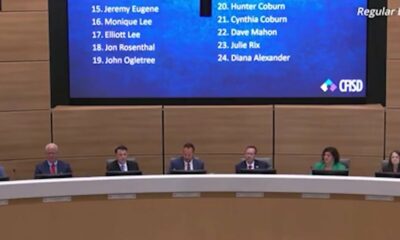News from the South - Arkansas News Feed
Religious freedom bill advances after Arkansans say it will foster anti-LGBTQ+ discrimination
by Tess Vrbin, Arkansas Advocate
April 2, 2025
An Arkansas House committee approved a bill Tuesday that supporters said would protect religious freedom, a day after the Senate rejected a bill with a similar stated goal.
House Bill 1615 will be heard by the full House Wednesday after passing the Judiciary Committee on a split voice vote following nearly an hour of public opposition. The bill would “prohibit the government from discriminating against certain individuals and organizations because of their beliefs regarding marriage or what it means to be female or male.”
This would protect Arkansas government employees from adverse employment action if they refuse to do something within the context of their jobs that conflicts with their “sincerely held religious beliefs,” such as providing a marriage license to a same-sex couple, according to the bill.
House Bill 1669, which had similar language regarding the “sincerely held religious beliefs” of parents seeking to foster or adopt children in Arkansas, failed in the Senate Monday after passing a House committee, the full House and the Senate Judiciary Committee in March. The bill’s Republican sponsors, Rep. Mary Bentley of Perryville and Sen. Alan Clark of Lonsdale, said HB 1669 would ensure Arkansas does not join the ranks of states in which parents who do not accept or affirm LGBTQ+ children’s identities are not allowed to foster or adopt.
Sen. Jonathan Dismang, R-Searcy, said the bill would set a “dangerous precedent” by shielding foster or adoptive parents from adverse government action if their faith-based actions harm children. He reminded the chamber that not all “sincerely held religious beliefs” are Christian.
Fifteen Republican senators voted for the bill, which needed 18 votes to pass. Dismang and three other Republicans joined the chamber’s six Democrats in voting against the bill. Five more Republicans did not vote and four voted present. The Senate later expunged the vote, and the bill is on the upper chamber’s Wednesday agenda.
The original version of Act 733 of 2023 included language about foster care, adoption agencies and the issuing of marriage licenses similar to both HB 1669 and HB 1615. That legislation was amended to remove such specific language. Critics said it would not only empower anti-LGBTQ+ discrimination but also would contradict a similarly worded ballot measure that voters rejected in 2022.
Rep. Robin Lundstrum, R-Elm Springs, is the primary sponsor of Act 733 and HB 1615. Attorneys from the conservative First Liberty Institute and the Family Council’s Arkansas Justice Institute supported Lundstrum in presenting the bill to the House Judiciary Committee on Tuesday.
Tuesday’s debate
Attorney J.P. Tribell was the only opponent of Bentley’s bill in the March 12 House committee hearing, but one of eight opponents of HB 1615 Tuesday.
“[There are] some rural counties where possibly everybody in the courthouse might be opposed to gay marriage, and if somebody wants to get a marriage license and they can find nobody, at what point do we determine that there’s an undue burden on the person seeking a marriage license?” Tribell said. “Do they have to drive two to three hours to get to Little Rock to do that?”
Civics educator Gail Choate said HB 1615 espouses the “opposite logic” of Act 116 of 2025, which all but one of HB 1615’s 13 sponsors supported. Act 116 prohibits public entities from engaging in identity-based “discriminination” or “preferential treatment” in contracting and hiring practices.
“This bill does not evaluate individuals based on their actions, their qualifications or their ability to contribute to society,” Choate said. “It singles them out solely based upon their identity.”
Other opponents of the bill spoke on behalf of themselves or their loved ones in the LGBTQ+ community. Kaymo O’Connell, a transgender high school senior from Little Rock, expressed concern about experiencing employment discrimination upon entering the workforce in the near future.
HB 1615 allows government employees who issue marriage licenses to recuse themselves from doing so. Marie Mainard O’Connell, Kaymo’s mother, said HB 1615 lacks a public notification process for such recusals.
“That’s where the harm occurs,” she said. “[People] are harmed when they expect to be cared for, and then they are told, ‘I don’t believe that about you, I don’t have to care for you that way.’ That creates a moment of trauma.”
Social workers Kirsten Sowell and Courtney Frierson said HB 1615 would create a conflict between their ethical codes, which include acceptance of LGBTQ+ people, and the fact that the state issues their professional licenses.
“If my licensing board receives a complaint based on someone’s religious disagreement with my inclusive care, who are they supposed to protect: me or the complainant?” Frierson said. “That’s a legal gray zone, and it’s not theoretical, it’s coming.”
No members of the public or of the House Judiciary Committee spoke in favor of HB 1615. Opposition on the committee primarily came from its Democrats, including Rep. Nicole Clowney of Fayetteville, who called it “blatant viewpoint discrimination.”
“We heard a lot of abstract ideas about religious freedom [today],” she said. “We did not hear from one person who is for this bill who is currently being persecuted.”
GET THE MORNING HEADLINES.
Arkansas Advocate is part of States Newsroom, a nonprofit news network supported by grants and a coalition of donors as a 501c(3) public charity. Arkansas Advocate maintains editorial independence. Contact Editor Sonny Albarado for questions: info@arkansasadvocate.com.
The post Religious freedom bill advances after Arkansans say it will foster anti-LGBTQ+ discrimination appeared first on arkansasadvocate.com
News from the South - Arkansas News Feed
City of Little Flock rebuilding almost a year after tornadoes
SUMMARY: Almost a year after tornadoes hit Little Flock, rebuilding efforts are slow but ongoing. City Hall was destroyed, and officials are now operating out of a trailer. The city council approved negotiations with Nabholz Construction for a new building, though the total cost remains uncertain. FEMA will cover 75% of rebuilding costs, with the city seeking funds for the remaining 25%. Trade war concerns could increase material costs. Debris remains in some areas, but neighbors continue to help with cleanup. The mayor hopes to start construction in 3-4 months but may need additional grants if costs rise. A local nonprofit also struggles to clear debris due to limited funds.

City of Little Flock rebuilding almost a year after tornadoes Subscribe to 40/29 on YouTube now for more: http://bit.ly/PTElbK Get …
News from the South - Arkansas News Feed
Research into biodegradable plastics involves Arkansas scientist
by John Lovett, Special to the Advocate, Arkansas Advocate
April 28, 2025
FAYETTEVILLE, Ark. — While biodegradable plastics currently account for a half percent of the hundreds of millions of tons of plastic produced annually, a growing demand for the alternative reflects consumer awareness and corporate response.
Researchers from Brazil, Germany and the United States document a multi-faceted global snapshot of the environmental aspects and trends surrounding single-use plastics in a review article titled “Rethinking single-use plastics: Innovations, policies, consumer awareness and market shaping biodegradable plastics in the packaging industry.” The piece was recently published in Trends in Food Science & Technology.
The researchers state that the largest area of application for biodegradable plastic materials is the packaging segment, which accounts for about half of single-use plastic production. The biodegradable packaging market was estimated to reach about $105 billion in 2024 with an expected annual growth rate of about 6 percent between 2024 and 2029, and 44 percent of patents filed worldwide for biodegradable polymers relate to packaging, the study noted.
About 474 million tons of plastics are produced globally each year, and about a third of it is used for packaging, including single-use plastic products for food and beverage containers. Of this, only about 25 percent gets recycled. Plastic production, the article adds, is expected to triple by 2060 following a trend of transitioning from durable plastics to single-use plastics.
Global plastic production increased from 369 million tons in 2016 to 404.5 million tons in 2020, partly due to materials used in the COVID-19 pandemic.
Citing a 2021 study from the same research group in Brazil, the review article noted the pandemic “exacerbated the use of single-use plastic and increased the demand for personal protective equipment and packaging, leading to remarkable growth in the plastics industry and generating more than 8 million tons of waste, mainly affecting Asia, Europe and America.” The same study mentions that the pandemic expanded food packaging due to a shift in eating habits and an increase in online purchases.
Despite the transition to single-use plastics, an increasing number of patents and successful research and development of biodegradable plastic materials has sparked the interest of industries to invest in large-scale production technologies for renewable monomers and polymers, the researchers added.
Looking to corn
Barone is supervised by Ana Elizabeth Cavalcante Fai, corresponding author for the review article, a food engineer and associate professor in food science at Rio de Janeiro State University, where she coordinates the Laboratory of Multidisciplinary Practices for Sustainability at the Institute of Nutrition.
“Food packaging plays a vital role in ensuring food safety and quality,” Fai said. “However, it is increasingly unjustifiable to produce short-life cycle packaging using synthetic plastics that persist in the environment for up to 400 years. Even more concerning is the growing awareness that plastics don’t degrade completely — they fragment into micro- and nanoplastics, which are now recognized as widespread environmental pollutants and an emerging public health concern.”
Ferreira said that while biodegradable plastics are a promising long-term alternative solution, it is not where he expects to see the biggest short-term impact on the reduction of overall plastic use.
Fai and Barone said that plastic has undeniably transformed modern life since its mass production began in the 1950s. However, despite its versatility and usefulness, “plastic has often been misused and is frequently applied to single-use items which are discarded with little regard for environmental consequences.”
“Most of the plastic ever made still exists in some form today,” Fai said. “When people say, ‘just throw it away,’ we must remember — there is no ‘away.’ Everything remains within the boundaries of our shared environment. The planet simply cannot absorb this volume of waste indefinitely. If current trends continue, some projections estimate that by 2050, there could be more plastic than fish in our oceans. This is not just alarming — it’s a call to urgent action.”
A “circular economy,” Ferreira said, could have a larger long-term impact on single-use plastic reduction. A circular economy broadens the familiar slogan of “reduce, reuse, recycle” to “rethink, refuse, reduce, reuse, repair and recycle,” in that order.
Brazil has an extraordinary biodiversity, Fai said, and a significant agro-industrial biomass base, rich in polysaccharides such as starch, pectin, lignin, and others. These valuable raw materials can be transformed into bio-based and biodegradable packaging for the food industry, she added.
“Through international partnerships, where each research group contributes its unique expertise, we can join efforts to develop sustainable and innovative packaging solutions,” Fai said. “This collaborative approach is key to building a more sustainable future for food systems worldwide,” said Fai and Barone.
“We are part of the problem as consumers, but at the end of the day, as consumers we can be part of the solution,” Ferreira said.
Co-authors of the review article on single-use plastics include Carollyne Maragoni-Santos of Federal University of the State of Rio de Janeiro; Patricia Marques de Farias of the Sustainable Packaging Institute in Germany; Camila Marcolongo Gomes Cortat of the Laboratory of Multidisciplinary Practices of Sustainability, Institute of Nutrition at the State University of Rio de Janeiro; Bianca Chieregato Maniglia of the University of São Paulo; and Ricardo Schmitz Ongaratto in the chemistry school at Federal University of Rio de Janeiro.
Plastics on the farm
“In our transplant production, rather than using the single-use plastics that you see in a store when you get plants, we use extra sturdy plastic transplant trays,” Friedrich said. “We know farmers who have used these for 20-plus years and are still strong.”
Friedrich said the CAFF farm also uses a paper pot system adapted from Japan that uses a chain of paper strips to form cells in which they grow the transplants. The training farm also uses a landscape fabric instead of plastic mulch for weed control, which can be reused over many years.
However, use of single-use plastic is unavoidable at times. For its “tractor-scale” production, CAFF uses the black plastic seen on strawberry beds at u-pick operations.
“Plants respond well to plasticulture because it warms the soil early, creates a weed free zone and delivers water directly to the plant roots,” Friedrich said. “The current biodegradable options for this function can’t hold up over the long, hot season.”
A thick, clear plastic is used to cover high tunnels at the farm, but that material has a longer lifespan of four to six years. High tunnels differ from greenhouses by generally having less climate control but still allow protection of plants from the elements and extend the growing season from early spring to late fall.
Irrigation drip tape — a flat tubing that provides water directly to plant roots — can also be a source of plastic on the farm, Friedrich said, and they try to use theirs for multiple years to minimize landfill deposits.
“In other areas of the state, there are recycling options that farmers can off-load their irrigation plastic,” Friedrich said.
Polypipe is commonly used for irrigation in row crop operations. When the season has ended, farmers roll up the pipe and drop it off for recycling.
The Center for Arkansas Farms and Food was developed to strengthen and expand our food and farming system by providing new opportunities to shape our current and future farmers, food entrepreneurs and food system leaders. CAFF is a program of the Arkansas Agricultural Experiment Station through the University of Arkansas System Division of Agriculture.
Through experiential learning, the center’s programs train farmers and food entrepreneurs with the production and business skills and resources necessary to develop resilient businesses that sustain our ecosystem, our land and our communities.
GET THE MORNING HEADLINES.
Arkansas Advocate is part of States Newsroom, a nonprofit news network supported by grants and a coalition of donors as a 501c(3) public charity. Arkansas Advocate maintains editorial independence. Contact Editor Sonny Albarado for questions: info@arkansasadvocate.com.
The post Research into biodegradable plastics involves Arkansas scientist appeared first on arkansasadvocate.com
Note: The following A.I. based commentary is not part of the original article, reproduced above, but is offered in the hopes that it will promote greater media literacy and critical thinking, by making any potential bias more visible to the reader –Staff Editor.
Political Bias Rating: Center-Left
This content leans center-left as it emphasizes environmental concerns related to plastics, the importance of sustainable innovations like biodegradable plastics, and the promotion of a circular economy. The narrative highlights scientific research, environmental responsibility, and the need for systemic changes, which align with progressive and environmentally conscious viewpoints. However, it maintains a balanced tone without overtly ideological language or partisan framing, making it more moderate than far-left activism. The article encourages practical solutions and consumer awareness, typical of center-left environmental discourse.
News from the South - Arkansas News Feed
Arkansas abortion ban gets tweaked; pro-choice advocates plan “immersive” event
by Tess Vrbin, Arkansas Advocate
April 25, 2025
The Arkansas Abortion Support Network plans to show people on Saturday what seeking an abortion was like before the state’s ban took effect nearly three years ago, the group announced in a press release.
The “immersive” event will take place at a former Little Rock abortion clinic that now houses the Your Options Understood (YOU) Center, which AASN launched in the fall of 2022. The center provides resources about abortion, parenting or adoption.
Little Rock Family Planning Services was the only abortion provider in Arkansas before the state enacted one of the nation’s most restrictive abortion bans, with a narrow exception to save the life of a pregnant person in an emergency.
AASN has helped fund out-of-state abortion services since Arkansas’ 2019 “trigger” abortion ban took effect upon the U.S. Supreme Court’s reversal of Roe v. Wade in June 2022.
Arkansas lawmakers have since proposed restricting abortion further or clarifying the terms of the existing ban. Some of those proposals became law after the 2025 legislative session, which ended last week, and the 2023 session, which saw a wider range of maternal and reproductive health legislation.
Brittaney Stockton, AASN’s policy and growth strategist, said she and other activists take issue with legislation that further governs abortion resources when the procedure is already banned. An unsuccessful bill this year would have required health care facilities to be licensed as ambulatory surgery centers in order to perform abortions if the procedure becomes legal again.
“We do not have access to abortion, but [lawmakers] are still doing everything they can to chip away and make it harder,” Stockton said.
Arkansas Legislature saw wide range of maternal and reproductive health legislation in 2023
Even while Roe v. Wade was still in place, state law required Arkansans seeking abortions to jump through “additional hoops,” which will be included in Saturday’s reenactment, Stockton said. Such “hoops” included a pregnant patient’s written consent for an abortion, a 72-hour waiting period between a doctor’s consultation and the procedure, and the requirement for doctors to show ultrasound images to pregnant patients seeking abortions.
Participants in Saturday’s event will learn why patients of the former clinic sought abortions. No personal information will be shared, Stockton said.
A key aspect of the event will be the portrayal of anti-abortion protesters outside the clinic, which can be “traumatic” for abortion seekers, Stockton said.
“We really want folks to understand what it was like to come into a clinic,” she said. “Whether you were there for a fetal anomaly or because you experienced sexual assault, or whatever … you still had to go through protesters telling you that you were evil, and making a terrible decision, and ‘Why can’t you just think about the baby?’”
The reenactment should last between 10 and 15 minutes, but wait times at abortion clinics used to last hours, Stockton said.
Afterward, attendees will have the opportunity to watch the film Preconceived, a documentary “contrasting the abortion experience with the misleading tactics of crisis pregnancy centers,” according to AASN’s news release. The event is scheduled from 11 a.m. to 1 p.m.
The YOU Center is next to Arkansas Pregnancy Resource Center’s Little Rock location. APRC is one of several anti-abortion centers state lawmakers have supported with taxpayer funds since the abortion ban took effect. Thirty-five organizations applied for shares of the $2 million set aside last year; pro-choice advocates have said these centers mislead pregnant people about their options.
Stockton participated in last year’s attempt to put a proposed limited right to abortion on the November ballot. Many Arkansans were unaware of the near-total abortion ban, she said, and some of her fellow canvassers were not aware of the former abortion clinic in Little Rock.
Saturday’s event is an effort to close gaps in public knowledge about abortion in Arkansas, Stockton said.
“There’s hope in knowing what happened in the past so you can understand and do better moving forward,” she said.
The Arkansas Abortion Amendment did not make it to the ballot after the Secretary of State disqualified more than 14,000 signatures on a technicality.
Other Arkansas laws ban abortions at 12, 18 and 20 weeks’ gestation. A Democrat-sponsored bill to repeal these bans and restore abortion access in Arkansas was not considered by the Republican-led Legislature this year.
Legislative background
AASN’s services at the YOU Center include free emergency contraceptives, condoms and pregnancy tests. The organization distributed more than 13,000 doses of emergency contraception in 2024, Stockton said.
She also said Arkansans should not take the availability of contraceptives for granted because in her 15 years as a pro-choice advocate, she has watched lawmakers place more and more restrictions on abortion before and after Roe v. Wade’s reversal.
Earlier this month, a House committee rejected a bill from Rep. Robin Lundstrum, R-Elm Springs, that would have required minors to obtain written parental consent in order to receive long-acting reversible contraception, such as an intrauterine device (IUD). The Arkansas chapter of the American Academy of Pediatrics opposed the bill.
Lundstrum said Thursday she has not decided if she will reintroduce the bill in a future legislative session. She said she wanted the bill to “open this conversation” that IUDs can have side effects and do not prevent sexually transmitted diseases even though they prevent pregnancy.
“These kids are thinking it’s a get-out-of-jail-free card,” Lundstrum said. “The parents and the doctor and the kids need to have a conversation that this is not a be-all end-all.”
Arkansas’ teenage pregnancy rate is more than twice the national average, with the majority of those pregnancies unplanned, according to data from Arkansas Advocates for Children and Families. The organization said last year that greater access to contraception and a more robust sex education landscape would reduce the rates of teen pregnancy and birth.
In February, a Senate committee rejected a proposal to require public school students, starting in fifth grade, be shown a fetal development video created by an anti-abortion organization. Stockton spoke against the bill and advocated for more comprehensive sex education in public schools; state law requires abstinence-based sex education, if it is taught at all.
A separate bill that became law this month will require “human fetal growth and development education” and the viewing of an ultrasound video at grade levels to be determined by the Arkansas Department of Health.
Lundstrum said she’s not aware of any upcoming proposals to further change Arkansas’ abortion laws.
She said she was asked to sponsor Act 387 of 2025, which clarifies that doctors can perform abortions to save a pregnant Arkansan’s life within “reasonable medical judgment.” The law will “let doctors in emergency situations be doctors,” Lundstrum said. It passed the Legislature with bipartisan support.
Another new Arkansas reproductive health law — Act 859, the Reproductive Empowerment and Support Through Optimal Restoration (RESTORE) Act — requires all entities that receive federal family planning service grant funds to provide services that help women track and manage their fertility.
“The RESTORE Act is groundbreaking legislation that champions reproductive healthcare for women in Arkansas by prioritizing restorative reproductive medicine,” conservative group Heritage Action for America stated in a news release Wednesday.
The law also prohibits state-funded entities from penalizing a medical professional who declines to participate in fertility treatments due to “sincerely held religious beliefs or moral convictions.” Another new law allows medical providers to opt out of providing abortions for religious reasons.
GET THE MORNING HEADLINES.
Arkansas Advocate is part of States Newsroom, a nonprofit news network supported by grants and a coalition of donors as a 501c(3) public charity. Arkansas Advocate maintains editorial independence. Contact Editor Sonny Albarado for questions: info@arkansasadvocate.com.
The post Arkansas abortion ban gets tweaked; pro-choice advocates plan “immersive” event appeared first on arkansasadvocate.com
Note: The following A.I. based commentary is not part of the original article, reproduced above, but is offered in the hopes that it will promote greater media literacy and critical thinking, by making any potential bias more visible to the reader –Staff Editor.
Political Bias Rating: Left-Leaning
This content presents a strong pro-choice perspective, advocating for increased access to abortion services in Arkansas and opposing restrictive abortion legislation. It discusses efforts by the Arkansas Abortion Support Network (AASN) to raise awareness about the challenges of seeking an abortion in the state after the ban took effect, highlighting emotional and logistical barriers faced by abortion seekers. The language used also criticizes lawmakers who attempt to “chip away” at abortion rights and points to legislative actions that further restrict access.
The article clearly reflects an advocacy for reproductive rights, particularly in opposition to anti-abortion policies and practices. This aligns with a left-leaning stance on abortion and reproductive health, as the content emphasizes the need for more access and criticizes conservative legislation.
-

 SuperTalk FM7 days ago
SuperTalk FM7 days agoNew Amazon dock operations facility to bring 1,000 jobs to Marshall County
-

 News from the South - Missouri News Feed3 days ago
News from the South - Missouri News Feed3 days agoMissouri lawmakers on the cusp of legalizing housing discrimination
-

 Mississippi Today2 days ago
Mississippi Today2 days agoDerrick Simmons: Monday’s Confederate Memorial Day recognition is awful for Mississippians
-

 News from the South - Florida News Feed7 days ago
News from the South - Florida News Feed7 days agoFederal report due on Lumbee Tribe of North Carolina’s path to recognition as a tribal nation
-

 Mississippi Today5 days ago
Mississippi Today5 days agoStruggling water, sewer systems impose ‘astronomic’ rate hikes
-

 News from the South - Georgia News Feed7 days ago
News from the South - Georgia News Feed7 days agoOrganization files ethics complaint against Warnock | Georgia
-

 News from the South - West Virginia News Feed5 days ago
News from the South - West Virginia News Feed5 days agoIs West Virginia — and the rest of the country — prepared to care for our seniors?
-

 The Conversation7 days ago
The Conversation7 days agoPerfect brownies baked at high altitude are possible thanks to Colorado’s home economics pioneer Inga Allison









































